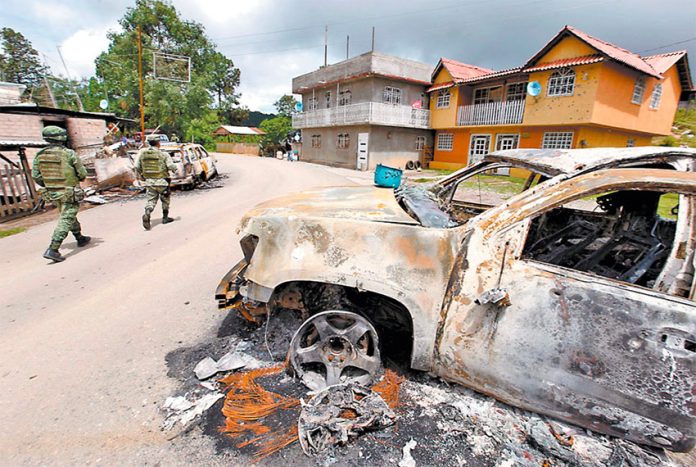Thirty years ago, a kilogram of opium paste sold for as much as 80,000 pesos in the mountains of the southern state of Guerrero, remembers a long-term resident.
But today, says Arturo López, who lives in the municipality of Leonardo Bravo, a kilo of the same product fetches just 5,000 pesos (US $250) or 16 times less.
The drastic price slump — exacerbated recently by a reduction in demand for opium paste due to its substitution in heroin production with the synthetic opioid fentanyl — has had a devastating impact on the sierra region, which is located in the geographical center of the state.
“I’ve been living in this place uninterruptedly for 35 years and 90% of the people here grow poppies, there’s no reason to fool ourselves,” López told the newspaper Milenio.
“Thirty years ago, a kilo [of opium paste] was bought for 50,000 or 80,000 pesos. The farmers handed it over to the narcos, who paid very well . . . They took care of transporting it to the clandestine laboratories and distributing it,” he explained.
However, the much lower price that campesinos are now paid for their illicit crop has “sunk the sierra into many problems,” “especially because we can’t grow anything else and if we did, we wouldn’t even earn 5,000 pesos per kilo.”
Guerrero security spokesman Roberto Álvarez Heredia recognizes that violence in the region has increased in recent years.
“We understand that there are two criminal groups fighting among themselves, one that operates in Chichihualco and the other in Tlacotepec . . . [They’re involved] in a violent battle that is causing a spike in violent homicides,” he told Milenio.
Álvarez explained that cartels that ship heroin to the United States previously used only opium as the raw material in the drug’s production, but now they have largely substituted that product with fentanyl, which he said is “cheaper and three times more potent.”
As a result, drug cartels are buying much less opium paste from growers in Guerrero.
Because criminal organizations based in the north of the country — where fentanyl is produced — have cut into local cartels’ profit margins, Álvarez explained, the latter “started to diversify their activities.”
Those groups — including the organization controlled by Juan Castillo (El Teniente) as well as others such as Los Rojos, Los Ardillos and the Sierra Cartel — have turned to “extortion, kidnapping, robbery [and] homicides,” the security spokesman said.
However, “above all, they’re relentlessly pursing the farmers so that they abandon their homes, give up their land and cede control,” Álvarez added.
The tactic appears to be working.
Earlier this month, around 90 families who lived in the Leonardo Bravo community of Corralitos fled their homes because of the violence that is plaguing the region.
On Tuesday of this week, the mayor of the neighboring municipality of Eduardo Neri was the target of an attack by armed men. Although he was uninjured, a woman and child were killed in the incident.
In those two municipalities as well as inHeliodoro Castillo and Zumpango, residents have been cultivating opium poppies for 50 years.
However, it has only been in more recent times that violence has become so bad that some residents have felt that they have no option but to leave.
Arturo López’s daughter is among those who left the sierra region but unlike many others, she has returned.
After finishing high school in Chichihualco — the municipal seat of Leonardo Bravo — Yuritzia López moved to the state capital Chilpancingo to study medicine and after years of hard work she qualified as a doctor.
But while Yuritzia was away from her home town to study and work, her father and other residents of the community of Filo de Caballos received so many threats from organized crime that she decided to abandon her medical career. She decided to enter politics with the hope of restoring peace to the region.
At state elections that will coincide with the presidential election on Sunday, Yiritzia López is aiming to become a congresswoman for the state’s 19th electoral district, representing the right-left For Mexico in Front coalition.
At the end of last month, the candidate released a campaign video that was partially filmed in a location that she knows only too well: a field filled with opium poppies in bloom.
But instead of railing against the plant and the damage that drugs can cause to people’s lives as many might have expected she would do, López instead proposed the legalization of the plant’s cultivation for use in the manufacture of legal pharmaceuticals.
She told Milenio that “we could be making what Mexico is consuming and in that way, we would save a lot of money.”
Speaking again while surrounded by opium poppies, López said that taxes collected via the sale of the pharmaceuticals could be used for infrastructure and security initiatives in the municipalities where the poppies are grown.
She added that legalizing opium poppy cultivation for medicinal purposes would avoid farmers being imprisoned for what essentially is their only means of survival.
Guerrero Governor Héctor Astudillo has previously said that legalizing cultivation would solve the region’s violence problem although that view is not shared by everyone.
“. . . I don’t think that [legalization] would definitively end the [violence] problem,” said Crescencio Pacheco, a farmer and self-defense group leader in Leonardo Bravo.
Whether opium poppy cultivation is legal or not, the violence will continue, he said, because it’s not opium paste that the criminal gangs are fighting over anymore but rather the control of territory in which to carry out extortion and robberies.
Source: Milenio (sp)
